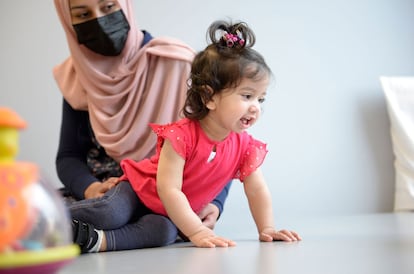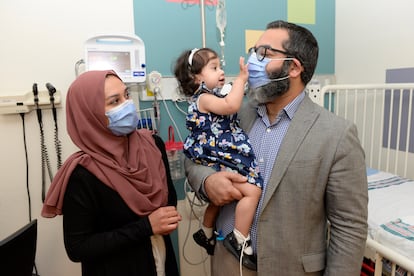In-utero treatment of a fatal genetic disease saves a young life
Little Ayla’s parents decided to risk another natural pregnancy despite knowing that both had potentially fatal genetic mutations

Choosing a partner with whom to have children can be a game of genetic roulette, and Sobia Qureshi and her spouse Zahid Bashir didn’t fare well. They both have a very rare mutation that causes a fatal disease in infants if both parents have it. Their first two daughters, Zara and Sara, died from this disease. But their third daughter, Ayla, was saved by a pioneering, in-utero treatment and is now a happy toddler of 16 months. The new procedure also looks promising for treating other rare genetic diseases.
Sobia and Zahid’s daughters were all afflicted by Pompe disease, a rare, inherited genetic disorder (one in every 100,000 births) that causes a deficiency in the protein that breaks down glycogen, a form of sugar stored in the muscles and used for energy. Without this protein, glycogen builds up dangerously in muscle cells, and children with the disease die with grossly enlarged hearts.
Pediatric surgeon Tippi Mackenzie, of the University of California, San Francisco, came up with an idea that she thought could work. People with a less severe form of the disease are currently treated with periodic intravenous injections of the missing protein, which is extracted from Chinese hamster ovary cells. Mackenzie’s idea was to administer the missing protein much earlier in the patient’s life – injected directly into the tiny umbilical cord of the fetus. After six rounds of injections, Ayla was born with a perfect heart. The innovative treatment, previously only tested in mice, is described in a scientific paper recently published in the New England Journal of Medicine.
Ayla’s parents, Ottawa residents Sobia Qureshi and Zahid Bashir, already knew they both had this genetic mutation, but still decided to have another child. Dr. Montserrat Morales, a physician and surgeon at Madrid’s 12 de Octubre Hospital, says that a much simpler alternative would have been preimplantation genetic diagnosis, which involves identifying and discarding embryos with lethal genetic mutations, and only transferring healthy ones to the mother’s uterus. Many people of different religious faiths object to discarding embryos, as did Sobia and Zahid, both Muslims.

The Koran, an Islamic sacred book written down in the seventh century, of course does not mention preimplantation genetic diagnosis, but contemporary Islamic leaders have carefully established rules governing assisted reproduction for Muslims. Islamic law, for example, prohibits artificial insemination if the sperm is from a donor, but allows it with the husband’s sperm, as long as the masturbation is performed by the wife herself. “Selection of the most viable embryos is allowed, as long as those not selected are not donated to other patients. Islam forbids abortion, but discarding abnormal embryos or embryos that have not been transferred to the mother’s uterus is permitted since they are not yet fetuses,” says the Bernabeu Institute website. But Sobia and Zahid didn’t want to do this.
Dr. Montserrat Morales specializes in congenital metabolic disorders at the 12 de Octubre Hospital, one of the largest in Spain. She has only seen about 15 cases of Pompe disease in her career, and thinks that the new, in-utero treatment will only benefit a small group of parents: “Those who have already had a child, because it is the only way they know that it [Pompe disease] is going to happen again, but they still decide to conceive again.”
The Catholic Church has stated its opposition to embryo selection, even if it is done to avoid fatal diseases, and Spain’s bishops condemned the technique back in 2006. Preimplantation genetic diagnosis is socially accepted by Spanish secular society and covered by the public health system for some life-threatening diseases. In the United States, a country with a private healthcare system, people of diverse faiths are making the same decision as Ayla’s parents.
Pompe disease is one of more than 40 lysosomal storage diseases, so called because they are all caused by deficiencies of specific proteins in the lysosomes (organelles that contain digestive enzymes). Clinical trials are currently underway at the University of California, San Francisco, to test in-utero treatment of eight hereditary disorders: five types of mucopolysaccharidosis, two types of Gaucher disease and Wolman disease.
Dr. Mónica López, who specializes in rare diseases at Madrid’s Ramón y Cajal Hospital, stresses the need for realistic expectations. “It’s not going to be a cure, nor a panacea.” Ayla will need injections of the deficient protein every few weeks for the rest of her life unless another therapy is discovered. “These children will probably live much longer [due to the in-utero treatment] and could reach adolescence or their teenage years in much better shape than children who are treated after birth. But I think it will be difficult for them to develop normally,” said López.
For now, Ayla’s father is celebrating success. “We didn’t know if she would be able to walk, talk, eat, and laugh. We continue to be amazed at her progress every time reaches these milestones. We truly feel like Ayla is a miracle,” said Zahid Bashir.
Tu suscripción se está usando en otro dispositivo
¿Quieres añadir otro usuario a tu suscripción?
Si continúas leyendo en este dispositivo, no se podrá leer en el otro.
FlechaTu suscripción se está usando en otro dispositivo y solo puedes acceder a EL PAÍS desde un dispositivo a la vez.
Si quieres compartir tu cuenta, cambia tu suscripción a la modalidad Premium, así podrás añadir otro usuario. Cada uno accederá con su propia cuenta de email, lo que os permitirá personalizar vuestra experiencia en EL PAÍS.
¿Tienes una suscripción de empresa? Accede aquí para contratar más cuentas.
En el caso de no saber quién está usando tu cuenta, te recomendamos cambiar tu contraseña aquí.
Si decides continuar compartiendo tu cuenta, este mensaje se mostrará en tu dispositivo y en el de la otra persona que está usando tu cuenta de forma indefinida, afectando a tu experiencia de lectura. Puedes consultar aquí los términos y condiciones de la suscripción digital.









































